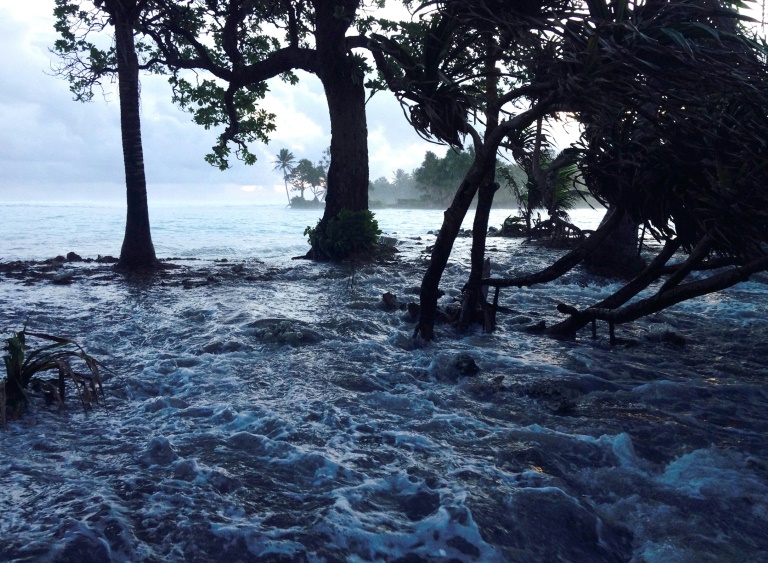High tide boosted by storm surges wash across Majuro Atoll in the Marshall Islands in the Pacific, threatened by rising sea levels and increasingly intense tropical storms
A group of small island nations joined calls on Tuesday for a windfall tax on oil companies to compensate developing countries for the damage caused by climate change-induced natural disasters.
Developing nations have pressed their case at the UN’s COP27 climate summit in Egypt for the creation of a “loss and damage” fund, arguing that rich nations are to blame for the biggest share of greenhouse gas emissions.
Oil companies have scored tens of billions of dollars in profits this year as crude prices have soared in the wake of Russia’s invasion of Ukraine.
“It is about time that these companies are made to pay a global COP carbon tax on these profits as a source of funding for loss and damage,” the prime minister of Antigua and Barbuda, Gaston Browne, told fellow leaders at the summit in the seaside resort of Sharm el-Sheikh.
“While they are profiting, the planet is burning,” said Browne, who was speaking on behalf of the 39-nation Alliance of Small Island States, many of whose very existence is threatened by rising sea levels and increasingly intense tropical storms.
Barbados Prime Minister Mia Mottley called Monday for a 10 percent tax on oil companies to fund loss and damage.
– ‘Fossil fuel non-proliferation treaty’ –
The contentious issue of loss and damage was added to the COP27 agenda after intense negotiations.
The United States and European Union have dragged their feet on the issue in the past, fearful of creating an open-ended reparations regime.
Browne acknowledged that the adoption of the agenda was “just one step” in the process, which gives a two-year space to negotiate.
“We look forward to the establishment and officialisation of the fund by 2024,” he said.
Browne also said a group of four island nations had registered a commission with the UN to “explore the responsibility of states for injuries arising from their climate actions and breaches in the obligations”.
“As small countries this is a new dynamic pathway of justice where the polluter pays,” he said.
Browne said small island states “will fight unrelentingly this climate crisis, and this includes fighting in the international courts and under international law”.
Another island nation, Tuvalu, announced it was joining a fossil fuel non-proliferation treaty, an initiative that seeks to phase out coal, oil and gas globally.
“The warming seas are starting to swallow our lands –- inch by inch,” Tuvalu’s Prime Minister Kausea Natano said in a statement.
“But the world’s addiction to oil, gas and coal can’t sink our dreams under the waves,” he said.
A Pacific neighbour, Vanuatu, was the first nation to join the treaty in September.









